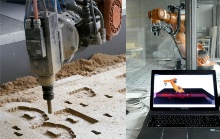Behavioural Design and Fabrication
Advanced Fabrication and Computation
First Meeting: 16.10.2019 at 9:45 AM, Room 10.07, Keplerstr. 11
The Behavioral Fabrication seminar introduces a new methodology for digital design and fabrication: contrary to traditional notions of design, behavioural strategies for fabrication are not based on the execution of apriori defined abstract plans, such as detailed digital design models, but are based on the concept of execution of tasks; tasks represent design intention and unfold in a non-deterministic way based on the constant interaction of the machine/robot/agent with the material and its environment through sensor-actuator feedback.
This course will introduce the topic of behavioral fabrication and related computational techniques:
- Agent-based and behavioral modelling
- Sensor feedback and machine vision
- Online robotic control methods
- Methods for environmental analysis and mapping
At the core of the research lie the analysis, abstraction, translation and implementation of fabrication-oriented behaviours for the production of physical prototypes. Students are expected to have a high degree of proficiency in computer programming (either in C# or in Python). It is recommended to take this course after having taken Robotic Fabrication, also offered by ICD.
Image credit: Distributed Robotic Assembly System for In Situ Timber Construction”, ICD/ITKE University of Stuttgart, Leder, Weber, 2018
Advanced Fabrication and Computation
First Meeting: 16.10.2019 at 9:45 AM, Room 10.07, Keplerstr. 11
The Behavioral Fabrication seminar introduces a new methodology for digital design and fabrication: contrary to traditional notions of design, behavioural strategies for fabrication are not based on the execution of apriori defined abstract plans, such as detailed digital design models, but are based on the concept of execution of tasks; tasks represent design intention and unfold in a non-deterministic way based on the constant interaction of the machine/robot/agent with the material and its environment through sensor-actuator feedback.
This course will introduce the topic of behavioral fabrication and related computational techniques:
- Agent-based and behavioral modelling
- Sensor feedback and machine vision
- Online robotic control methods
- Methods for environmental analysis and mapping
At the core of the research lie the analysis, abstraction, translation and implementation of fabrication-oriented behaviours for the production of physical prototypes. Students are expected to have a high degree of proficiency in computer programming (either in C# or in Python). It is recommended to take this course after having taken Robotic Fabrication, also offered by ICD.
Image credit: Distributed Robotic Assembly System for In Situ Timber Construction”, ICD/ITKE University of Stuttgart, Leder, Weber, 2018


